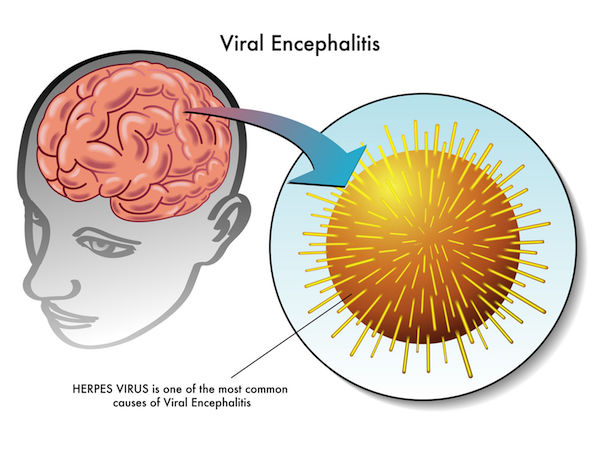Encephalitis is an inflammation of the brain that can be caused by an infection or through the immune system attacking the brain.

In many cases, a virus causes encephalitis, but it can be difficult to establish the causes.
There are different kinds of encephalitis and each has a different cause. The most common types are:
- Infectious: Inflammation is the direct result of an infection, which is often viral.
- Post-infectious: Inflammation is caused by the immune system reacting to a previous infection.
- Autoimmune: Inflammation is caused by the immune system reacting to a non-infectious cause, such as a tumour.
- Chronic: Inflammation develops slowly over many months and can be due to a condition such as HIV/AIDS.
Herpes simplex virus is one of the more common and serious causes of viral encephalitis. Herpes-related encephalitis can develop rapidly, and may cause seizures or mental changes and even lead to coma or death.
There are also types of encephalitis spread by mosquitoes and ticks. It can also be caused by rabies.
Encephalitis can be contagious.
What are its symptoms?
Encephalitis often starts with flu-like symptoms, such as a high temperature and headaches. More serious symptoms may then develop over the next few hours or days, including:
- Confusion, disorientation
- Decreased level of consciousness
- Seizures
- Changes in behaviour.
If you notice these symptoms, get to a hospital immediately.
Other symptoms can include:
- Light sensitivity
- Inability to speak
- Inability to control movements
- Stiff neck
- Hallucinations
- Loss of physical sensations
- Partial or total vision loss
- Involuntary eye movements.
How is it diagnosed?
Your doctor will conduct a physical examination and ask about your symptoms. He/she may ask for a blood sample and order a lumbar puncture or spinal tap, in which a needle is inserted into the lower back and a small amount of cerebro-spinal fluid (CSF) is taken from the spinal canal. This is tested for viruses or substances known to be associated with certain kinds of infections.
Other tools used in diagnosis include:
- Biopsy: A small amount of tissue is taken from the brain and tested.
- A CT Scan or Magnetic Resonance Image (MRI), in which computerised images of the brain show the extent of the swelling and damage to the brain.
- An electroencephalogram (EEG), which records electrical events in the brain.
What are your treatment options?
Because encephalitis complications can be serious, it most likely needs hospital treatment.
Your treatment will depend on your age and condition, as well as the form and cause of your disease. If your encephalitis is caused by a bacterial infection, it should be treated with antibiotics.
Treatment for herpes-related encephalitis includes antiviral therapy and supportive care. Other treatments can be used to treat fever and seizures if they develop, provide hydration and reduce any pressure in your skull.
With proper care, many people recover from encephalitis. However, babies are at greater risk of sustaining permanent brain damage, and there is a slower recovery rate with encephalitis in children.
Treatment for mild cases, which may be mistaken as the flu, mainly consists of bed rest, fluids and anti-inflammatory drugs to relieve a headache and fever.
Can it be prevented?
Children and adults should get routine vaccinations for viruses that can cause encephalitis. The elimination of smallpox and vaccines against mumps, measles, and German measles (rubella) has shown to reduce the incidence of encephalitis, especially in children.
People should receive specific vaccines if they are traveling to places such as parts of Asia, where Japanese encephalitis is found.
Other ways to prevent it are to avoid viruses that can lead to the disease (like herpes) and to protect yourself against mosquito and tick bites.
Other preventative measures include:
- Use an insect repellent
- Remove sources of standing water
- Wear long-sleeved shirts and pants when outside, especially at night.
- Vaccinate animals to prevent rabies.
What to do now
Book an appointment at your nearest Clicks Clinic for vaccines. Call 0860 254 257 to book an appointment or visit Clicks Clinic online.
IMAGE CREDIT: 123rf.com
